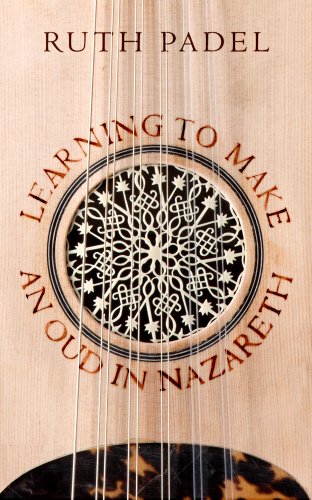 I have an ever increasing respect for poets. The skill and confidence to reduce an emotion, a story or an entire history to a few sparse stanzas is breathtaking. I recently re-read Ruth Padel’s simmering collection Learning to Learning to Make an Oud in Nazareth, which takes in Middle Eastern politics, culture and religion with a deftness I aspire to.
I have an ever increasing respect for poets. The skill and confidence to reduce an emotion, a story or an entire history to a few sparse stanzas is breathtaking. I recently re-read Ruth Padel’s simmering collection Learning to Learning to Make an Oud in Nazareth, which takes in Middle Eastern politics, culture and religion with a deftness I aspire to.
From generously crammed paragraphs to glimmering non-rhyming couplets, the poems examine the richness of beliefs in conflict with uncommon grace and intensity.
In the title poem, we’re walked through the steps of making a traditional musical instrument, and in Padel’s clear, thoughtful words, the act becomes unexpectedly sensual: “He damascened a rose of horn/with arabesques/as lustrous as under-leaves of olive”.
Deeper in, Padel offers up extraordinary images in a form that’s both relatable and achingly beautiful: “Bluebottles glint/on the mingled blood as when a village woman/stretches thread outside her house, weft/and warp between pegs in the dust”.
These are all observations from previous reads of the collection. This time around other lines rang in my head: “The past is not where you left it. Every choice/ is a loss. That corridor you didn’t follow, the gate/ to unknown woods, the unexplored stair, the blue door”. That section alone contains within in it the seeds of a thousand stories, and an enticing wealth of metaphors.
She draws us deep into the scene she paints, until “the glare disappears and then the walls themselves/ like a drop laid on the tongue.” This sudden intimacy is shocking, making us, for a moment, part of the poem.
Padel’s selected word jostle on the page, with carefully placed line breaks hoiking up their power to airdrop you into each scene Padel directs her gaze to. She sources lines and inspiration from artefacts, songs, psychology, the Bible and even television (‘The Just-World Hypothesis’ comprises a fragment of transcript from BBC’s Newsnight programme).
And while you may not fully understand every reference, I think you’ll find yourself resonating inwardly to the note of human plight that rumbles beneath the views drawn in by Padel.
Learning to Make an Oud in Nazareth by Ruth Padel is published by Chatto Poetry and available to buy from Amazon.
What are you reading? I’d love to know. I’m always happy to receive reviews of books, art, theatre and film. To submit or suggest a book review, please send an email to Judy(at)socketcreative.com.
